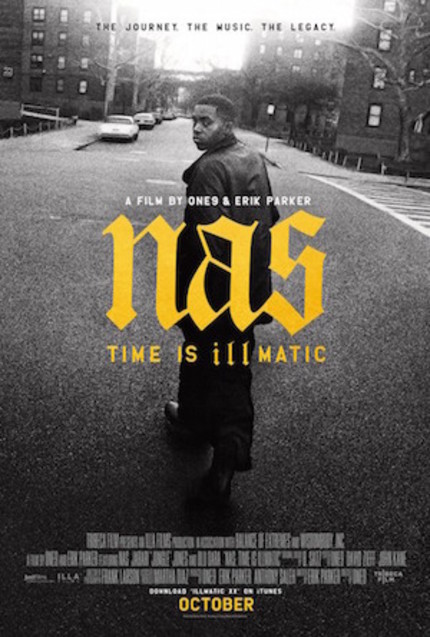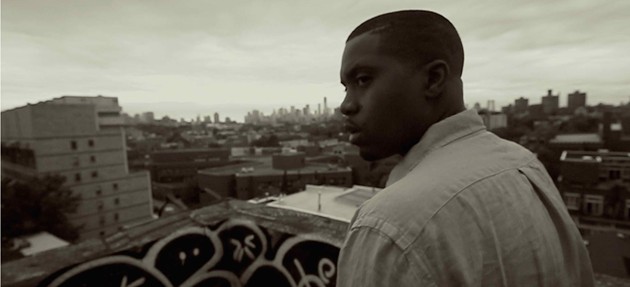In-Edit Mexico 2015 Interview: One9 And Erik Parker Talk NAS: TIME IS ILLMATIC

Nas: Time Is Illmatic is not the average "making of" documentary since it explores the creation of "Illmatic" - a classic East Coast hip hop album - from a personal perspective, approaching rapper Nas' origin and his experiences of growing up in New York public housing (Queensbridge).
Two decades after its original release, "Illmatic" (Nas' debut album) is considered by such current stars as Pharrell and Alicia Keys as one of the greatest records of all time. But more than presenting the usual dose of talking heads praising the iconic rapper, Nas: Time Is Illmatic, just like the album itself, manages to expose what it means to grow up as an African American in a forgotten place of the United States, where crime, drugs and death are everyday issues.
Since Nas: Time Is Illmatic had its Mexican premiere at the In-Edit Mexico festival (which was celebrated from August 26 to 30 in Cuernavaca, Morelos), I had the opportunity to interview via e-mail both the director/producer (One9) and the writer/producer of the documentary (Erik Parker).
ScreenAnarchy: What was the impact that Nas' "Illmatic" album had in your life when it came out?
One9: First time I heard Nas' "Illmatic" made me feel like I was listening to a street prophet, spraying a machine gun wild in the night. At that time I was a graffiti artist painting what I was listening to. I was in tune to what he was painting with his lyrics. I related to what "Illmatic" was saying, feeling, and reflecting... so insightful and raw. I remember having to play every song over and over again, because it was so powerful and visual.
Erik Parker: Nas' Illmatic blew my mind when I first heard it. The poetry was done on such a high level that in a way, it validated our existence, our culture. He used the language of the street at the time and made it art. Art tends to be validating. If you see yourself reflected in art, you feel validated. The things he was saying were sometimes hard realities but it was done on such a high level, I felt I could point to him as a representative. Someone who put my struggle and my worldview into poetry.
How was the first approach to Nas himself in order to make the documentary?
One9: When we first started the project in 2004, writer/producer Erik Parker was the music editor for VIBE magazine. He was writing a story on the 10th anniversary of "Illmatic" and reached out to me and a few friends about doing a DVD.
We never made a film before or went to film school. This was really an experiment we wanted to do because we were passionate about the culture and that album.
We first shot Nas' father Olu Dara. We learned about the Jones family, the jazz history, the books they read and the times they experienced growing up. After that we reached out to Pete Rock, Az, Premier and Faith Newman.
At this point we sent a trailer to Nas' manager and he brought Nas to dinner. We spoke and he was interested in the work at that point but not fully committed. It wasn't until a few years later when we showed him a rough cut that he said "you guys are making art" and he decided to fully commit to working on the film with us. That day changed everything. I felt free, wild and hungry to finish.
Parker: First we started shooting without Nas. We just started reaching out to people who were associated with "Illmatic." I was music editor for VIBE magazine, which covered music and culture. So I had some contacts.
I reached out to One9, Tuma Basa, Eddie Ojeda, Earl Jordan and we started shooting whoever agreed. After a while, we had enough for a trailer that One9 cut. That got us our first meeting with Nas. He was kinda interested but he didn't commit.
I mean, it took ten years to put the documentary out. But I think after we continued shooting and he saw all that we were doing, he decided we were sincere. And he seemed to be ready to tell his story by that time. One day we showed him a bunch of clips, photos and interviews we collected. He seemed to be blown away that day by all we had done.
The documentary is not the typical "making of" film as it features the background of Nas' family and his experiences of growing up. When did you decide to make a much more personal film only with people close to Nas and the album (aside of the brief interviews with people like Pharrell and Alicia Keys)?
One9: We wanted to tell the story of "Illmatic" from first hand experiences. The focus was on Nas, his brother Jungle and their father Olu Dara.
We looked at song like "N.Y. State of Mind," "Life's a Bitch," "One Love," and "Memory Lane" as examples on ways to look at issues like housing projects, the prison system, family breakdown and community.
We broke the film down into looking at these socio-economic issues and how they affected the Jones family and how a young Nasir Jones coped with the reality of becoming a man at a young age.
Parker: The doc has a narrow focus, which was important for us because the story can tend to get big, if you let it. We looked at the themes he talked about in the songs and we used it as a blueprint. So, for example, when you see "One Love" on the album, in which he talks about friends in prison, we do the same in the film.
Certain songs, like "The World is Yours" and "One Love", are deeply explored in the film. Which one would be the perfect song that features everything that "Illmatic" represents for you and why?
One9: "One Love" sheds light on what was going on in the community of Queensbridge, New York in the late 80's and early 90's. The lyrics are a letter Nas writes to his friends that are locked up. I feel that track shows the brilliance of how Nas can take bleak situations and shed light lyrically. The track Q-Tip produced using the Heath Brothers sample was dark and mystical. It's a perfect combination of truth, insight and reflection.
Parker: All the songs are pieces to the puzzle. They each represent something different. So it's really difficult to say one song represents the album. But if you have to listen to one, I think "One Love" is helpful to understanding some of the main themes in the album. In that song, which is basically a letter to a friend who is in prison, you find love, hope, and a few kids discussing the world they inhabit.
There are many meaningful moments in the movie, like Nas and his brother returning to Queensbridge, Nas recalling songs like "The Bridge" and "South Bronx" or Nas learning the present of the people from the original photo shoot for the album. Which makes you prouder?
One9: All the scenes in the movie are selectively chosen because they all represent a period that made "Illmatic" what it is. We tried to make a film 100% honest to what was said, heard and felt. The biggest compliment came from Nas when he told us we made the equivalent in movie form of what he wrote making "Illmatic." That meant the world.
This seems to be an exciting time for fans of classic hip hop with the release of your film and STRAIGHT OUTTA COMPTON. So what's your opinion of the current state of hip hop?
One9: I love any current form of rebellious music, art, film and culture. Each generation has their own voices that speak to the times. We document, direct and produce films that reflect the essence of our culture. We need to preserve and elevate the culture with the pioneers who created it and the fresh new voices who are breaking new ground.
Parker: Hip hop is still strong. As an art form, music helps people express themselves, find meaning in their own lives and connect with their tribes. Hip hop has evolved, thankfully. Kids are making music that is important to their lives and outlooks.
Every piece of music is not for everybody. We needed to hear what Nas was saying in "Illmatic," at the time of its release. There are songs and artists now who are trying to do the same thing: be honest to their experiences.
Older generations can sometimes look down on today's hip hop but I refuse that mindset. I remember how hurt I was when older people told me that Run-D.M.C. was jungle music or that it was not music at all. Or that LL Cool J was not art. Or that they couldn't understand the words Nas was saying. That's because it wasn't intended for them. But it made it no less beautiful and important to me. It's kind of funny that the same thing is still going on.








